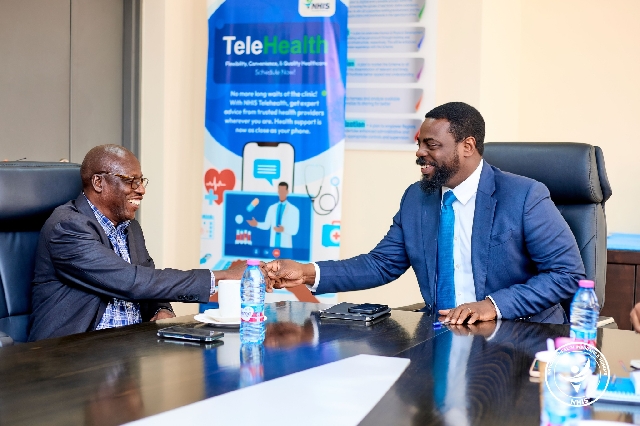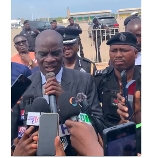SMLM-Gh calls for decoupling of laboratory revenue from general diagnostic services
 Dr. Senanu Kwesi Djokoto shaking hnads SMLM-Gh officials in his office
Dr. Senanu Kwesi Djokoto shaking hnads SMLM-Gh officials in his office
The National Health Insurance Authority (NHIA) has reaffirmed its commitment to deeper collaboration with the Society of Medical Laboratory Managers–Ghana (SMLM-Gh) following a high-level engagement at the Authority’s Head Office in Accra.
The meeting, led by NHIA Deputy Chief Executive of Operations, Dr. Senanu Kwesi Djokoto, brought together key members of the SMLM-Gh, including Board Chairman, Dr. David Sackey; Vice Chairman, Dr. Stephen J. Adusu; Financial Secretary, Dr. Pascal Hodogbe; Secretary, Dr. Nelson Ekow Kumah; and Member, Torgbi Dr. Adedze-Kpodo.
The discussions focused on strengthening the partnership between the NHIA and medical laboratory professionals, reviewing laboratory tariffs, enhancing stakeholder engagement, and clarifying the government’s proposed laboratory privatisation policy.
Dr. Djokoto underscored the crucial role of medical laboratories in Ghana’s healthcare value chain and assured the Society of Management’s determination to sustain collaboration for mutual growth.
Explaining the financial model of the National Health Insurance Scheme (NHIS), he noted that over 95% of the scheme’s funding comes from tax sources — including SSNIT contributions and portions of VAT — with premiums accounting for less than 5%.
“There are ongoing national discussions on whether premiums should be maintained, expanded, or scrapped entirely. Whatever direction we take, premiums must never become a barrier to access,” Dr. Djokoto emphasised.
On tariffs, he revealed that the NHIA has completed a comprehensive, evidence-based review aimed at introducing more realistic rates that reflect operational realities
“We have moved away from across-the-board increases to a more scientific approach.
Each service was assessed line by line — considering electricity, water, maintenance, and staffing costs,” he explained.
He announced that while implementation of the new tariffs — initially scheduled for mid-2025 — was delayed for budgetary and sustainability assessments, the rollout would take effect before January 2026.
“We will not enter 2026 with the old tariffs,” he assured.
“Our goal is to ensure providers are paid fair rates while reducing out-of-pocket expenses and advancing universal health coverage.”
Addressing concerns about the proposed privatisation of public laboratories, Dr. Djokoto clarified that previous discussions on establishing regional “centres of laboratory excellence” were exploratory, intended to leverage public-private partnerships through shared resources and expertise.
“Should the Minister revisit this matter, stakeholder input — especially from professionals like you — will be crucial to ensuring outcomes that serve both practitioners and the public,” he stated.
SMLM-Gh Board Chairman, Dr. David Sackey, commended the NHIA’s leadership for its proactive engagement and timely reimbursement of claims.
He, however, called for decoupling laboratory revenue from general diagnostic services to improve financial transparency and accountability.
“The current system lumps laboratory income with other diagnostic services, making accounting extremely difficult.
We urge the NHIA to explore alternative mechanisms that allow labs to operate with financial independence,” he appealed.
He also highlighted the need for tariffs that reflect actual operational costs, warning that underpriced reimbursements threaten the sustainability of laboratory services.
Supporting this, Dr. Pascal Hodogbe, the Society’s Financial Secretary, urged regular review of NHIS premiums and tariffs, stating that stagnation in rates was undermining service quality and creating friction between facility managers and healthcare professionals.
Torgbi Dr. Adedze-Kpodo, another member of the delegation, raised concerns about the potential negative effects of laboratory privatisation, stressing that such a policy could derail professional standards unless stakeholders are fully consulted before any final decision.
Responding, Dr. Lydia Anaab-Bisi, Acting Director of Quality Assurance, clarified that the bundling of laboratory services within general tariffs did not originate from the NHIA but from broader sector frameworks led by the Ghana Health Service.
“If decoupling is to happen, it must begin at the policy level.
Nothing is impossible, but alignment across institutions is essential,” she said.
Mr. Eugene Segbefia, Acting Deputy Director of Credentialing, expressed appreciation for the engagement and urged the Society to support NHIA’s National Electronic Health Service Application (NEHSA) and telehealth initiatives.
“We are expanding the NEHSA platform to integrate more laboratory data into the national health information system.
Your members’ participation will help improve coordination and access to quality healthcare nationwide,” he noted.
Both sides reaffirmed their commitment to ongoing dialogue, partnership, and evidence-based reform, emphasising that sustained collaboration is vital to achieving universal health coverage and strengthening Ghana’s healthcare delivery system.
Source: Classfmonline.com/Cecil Mensah
Trending News

Fiscal, environmental crimes: President Mahama announces plans to establish Specialised Financial Courts
20:58
Three arrested for shooting incident and trespassing at Celebrity Golf Club
16:14
President Mahama assures continued Ghana-Grenada rapprochement
18:18
Gov't committed to completing the Agenda 111 projects-Health Minister
17:19
Ministry of Health welcomes Orbis International Flying Eye Hospital to Ghana
11:23
Ghana to host 2025 trial of Association for the Development of Education in Africa
10:01
NADMO, UNDP calls for stronger investment in resilience as Ghana Marks 2025 International Day for Disaster Risk Reduction
12:44
Police investigate 'unnatural' death of Senegalese in Kumasi
20:53
Tema East MP urges industries to support ‘Back to School’ initiative for JHS graduates
15:57
Grenada PM reveals deep connection to Ghana, tracing ancestry to Akans
18:12



